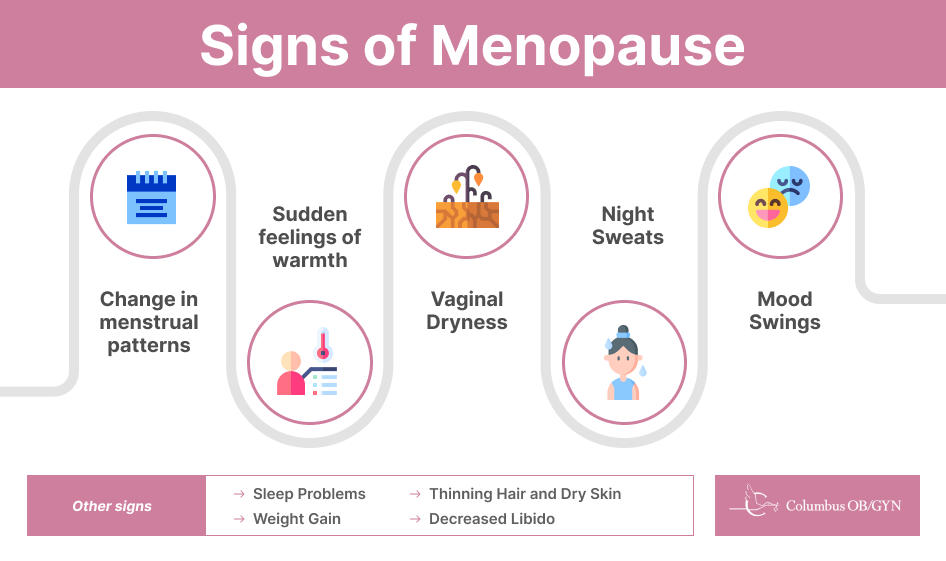
Managing Menopause Symptoms and Embracing Change
Menopause marks a significant phase in a woman’s life, characterized by the end of menstrual cycles and a series of physical and emotional changes.
This article provides insights into menopause symptoms and offers practical advice on embracing this change positively, from lifestyle modifications to medical treatments and alternative therapies.

Recognizing the Signs of Menopause
Menopause typically occurs between the ages of 45 and 55 and signifies the end of menstrual cycles and fertility. However, the path to menopause can vary greatly among individuals.
Symptoms start to appear during the perimenopausal phase, which can begin years before menopause itself. Recognizing the signs is the first step toward managing its symptoms effectively.
Early Indicators
One of the earliest signs is a change in menstrual patterns –– either more frequent or less so, and the flow may be lighter or heavier than usual.
While these changes are normal during the transition, they can sometimes be the first hint that menopause is beginning.
Common Symptoms
As you move closer to menopause, you might notice several more pronounced symptoms:
- Hot Flashes: Sudden feelings of warmth, usually most intense over the face, neck, and chest, can cause blushing and sweating.
- Night Sweats: These hot flashes occur at night, potentially disrupting sleep.
- Vaginal Dryness: Decreased moisture production can lead to discomfort, especially during intercourse.
- Mood Swings: Hormonal changes can also affect your emotions, leading to increased irritability or sudden mood changes.
Other Signs to Watch For
In addition to the more common symptoms, the following signs may indicate the onset of menopause:
- Sleep Problems: Difficulty falling or staying asleep, often exacerbated by night sweats.
- Weight Gain: Metabolic changes make maintaining your usual weight more challenging.
- Thinning Hair and Dry Skin: Changes in hormone levels can affect the appearance and texture of skin and hair.
- Decreased Libido: A reduction in sexual desire is common due to hormonal shifts and physical changes like vaginal dryness.

Lifestyle Modifications for Symptom Management
Adjusting your diet, incorporating regular exercise, and employing stress reduction techniques alleviate menopause symptoms.
Let’s explore these wellness tips in more detail.
Diet and Nutrition
Focus on incorporating these nutrients as they help balance hormones and support your body through this transition.
- Increase Calcium and Vitamin D: Essential for bone health, which is crucial as the risk of osteoporosis rises during menopause.
- Incorporate Phytoestrogens: Foods like soybeans, flaxseeds, and sesame seeds contain phytoestrogens, which may help balance hormones.
- Stay Hydrated: Hot flashes can lead to sweating and dehydration. Drinking plenty of water can help mitigate these effects.
- Limit Trigger Foods: Spicy foods, caffeine, and alcohol might trigger or worsen hot flashes and night sweats for some women.
Exercise and Physical Activity
Exercise helps with weight management, improves mood, strengthens bones, and enhances sleep quality.
- Aim for Moderate Activity: Incorporate at least two hours and 30 minutes of moderate aerobic activity per week. This could be brisk walking or cycling.
- Include Strength Training: Incorporate strength training exercises at least twice a week to support bone health and muscle mass.
- Stay Flexible: Yoga and stretching can improve flexibility, reduce stress, and decrease the severity of hot flashes.
Stress Reduction Techniques
Menopause can be a stressful time, with changes in hormone levels affecting your mood and emotions. Implementing these stress reduction techniques can help manage these emotional fluctuations:
- Practice Mindfulness and Meditation: These practices can reduce stress and improve sleep.
- Try Deep Breathing Exercises: Techniques like diaphragmatic breathing can help calm the nervous system and reduce the frequency of hot flashes.
- Engage in Relaxing Activities: Reading, taking a warm bath, or pursuing a hobby can provide a much-needed break from stress.
Maintaining a strong social support network and considering therapy or counseling can provide emotional support and strategies to manage stress effectively.

Medical Treatments and Therapies
There are several effective treatments and therapies available to manage menopause symptoms. Let’s explore these options to find what works best for you:
Hormone Replacement Therapy (HRT)
Hormone Replacement Therapy (HRT) works by replenishing the body with estrogen and, in some cases, progesterone, which naturally decreases during menopause.
By supplementing estrogen and progesterone, hot flashes, night sweats, and vaginal dryness are significantly alleviated.
Discuss the potential risks and benefits with your healthcare provider, as HRT may not be suitable for everyone.
Non-Hormonal Medications
For those who prefer not to use HRT or have health conditions that make it unsuitable, the following non-hormonal medications are good alternatives:
- Antidepressants: Certain low-dose antidepressants can reduce hot flashes and mood swings.
- Gabapentin: Originally used to treat seizures, gabapentin can also help manage hot flashes.
- Clonidine: Typically used for high blood pressure, clonidine can provide relief from hot flashes for some women.
Each option has its own set of potential side effects and effectiveness. It’s crucial to have a thorough discussion with your healthcare provider.
Alternative and Complementary Therapies
Many women turn to alternative and complementary therapies to manage their menopause symptoms more naturally. These include:
- Acupuncture: Some studies suggest that acupuncture can reduce the frequency and severity of hot flashes and improve overall well-being during menopause.
- Herbal Supplements: Phytoestrogens in plants like soy, flaxseed, and red clover mimic estrogen and may relieve mild symptoms. However, their effectiveness and safety are still under research, so it’s advisable to consult with a healthcare provider before starting any supplement.
- Mind-Body Practices: Yoga, tai chi, and meditation help manage stress, improve sleep quality, and reduce the intensity of menopause symptoms. Also, these practices promote relaxation and have the added benefit of improving physical fitness and mental health.
Embrace This Natural Transition With Ease
Managing menopause symptoms is not just about alleviating physical discomfort; it’s also about embracing change and finding new ways to enjoy a fulfilling and vibrant life post-menopause.
With the proper support and management strategies, you can navigate this transition with confidence and grace, opening the door to a new chapter filled with opportunities for growth and happiness.
Make your premenopausal years a positive and empowering experience –– contact Columbus OB/GYN today.







